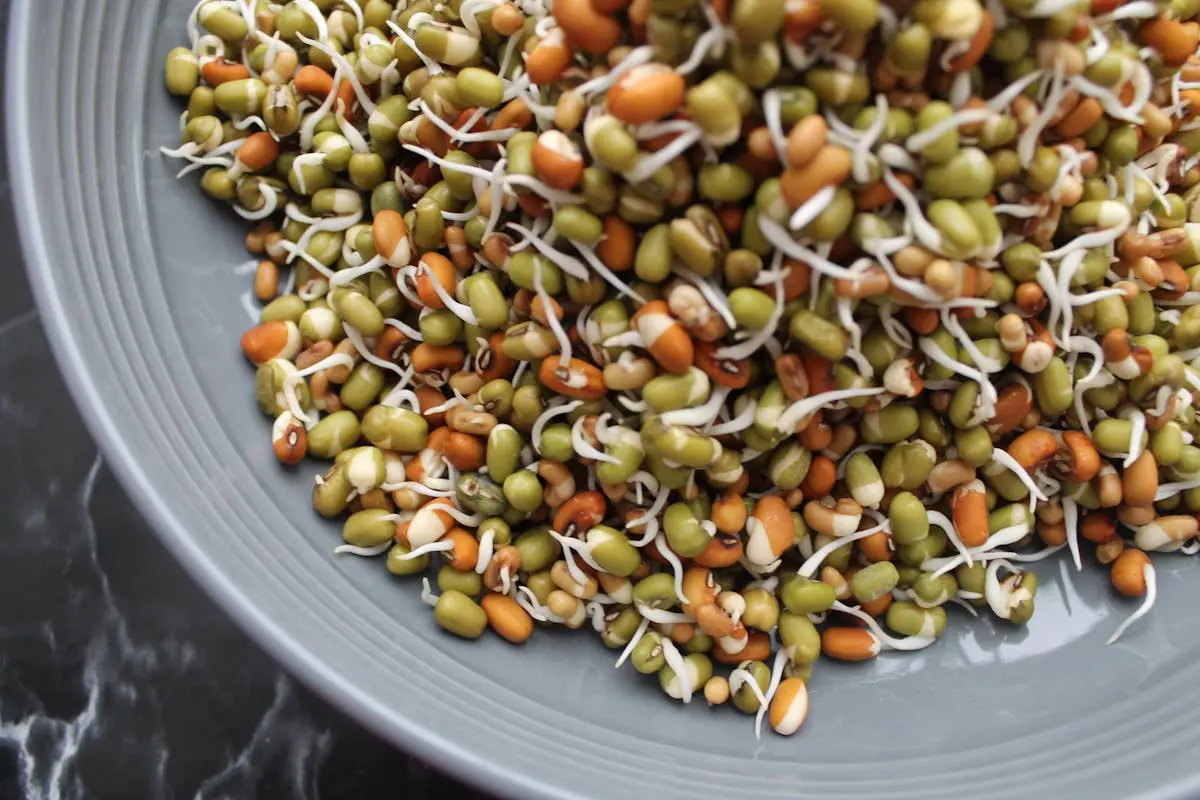
What are fresh sprouts?
Fresh sprouts are newly germinated seeds that are just a few days old and have begun to grow. They are harvested before they become full-grown plants. Sprouts can be from a variety of sources, including beans, peas, lentils, chickpeas, and seeds such as alfalfa, radish, broccoli, and mustard. When these seeds germinate, they release nutrients like Vitamin C, folate, fiber, and protein, making them a nutritious addition to your diet.
Nutritional benefits of fresh sprouts
Fresh sprouts are packed with essential nutrients such as Vitamins C, K, and E. They also contain higher levels of antioxidants and enzymes compared to fully grown vegetables. Additionally, fresh sprouts are rich in fiber and protein, making them an excellent addition to a healthy diet. Regular consumption of fresh sprouts can contribute to improved digestion, enhanced immune function, and overall well-being.
Health benefits of regular vegetables
Regular vegetables are packed with essential nutrients such as vitamins, minerals, and fiber. They contribute to maintaining a healthy weight, reducing the risk of chronic diseases, and promoting overall well-being. Incorporating regular vegetables into your diet can help improve digestion, support a strong immune system, and contribute to healthy skin and hair. Additionally, they are a great source of antioxidants, which can help prevent cell damage and reduce the risk of certain cancers.
Differences in nutrient content
Fresh sprouts are young, tender plants that are harvested just a few days after germination, while regular veggies are mature plants that have been allowed to grow to full size. According to a study published in the Journal of Agricultural and Food Chemistry, fresh sprouts contain higher levels of vitamins, enzymes, and antioxidants compared to their mature veggie counterparts. This is due to the fact that sprouts are in their early growth stage, making them rich in essential nutrients. On the other hand, mature vegetables may lose some nutrients during the ripening process. In terms of nutrient content, fresh sprouts have been found to have up to 100 times more enzymes than their mature counterparts, making them a more nutrient-dense option.
Comparison of taste and texture
When it comes to taste and texture, fresh sprouts have a milder flavor and a crunchy texture compared to regular vegetables. They offer a refreshing and delicate taste, along with a satisfying crispness. On the other hand, regular vegetables have a stronger and more pronounced flavor, along with a varied range of textures depending on the specific vegetable.
Cooking and meal preparation
When cooking with fresh sprouts, it’s important to handle them safely to prevent any potential contamination. Rinse the sprouts thoroughly under running water before use, and make sure to store them in the refrigerator at 40°F or below to keep them fresh. When incorporating fresh sprouts into your meal, consider adding them to salads, sandwiches, or wraps for an extra crunch and nutritional boost. Keep in mind that sprouts can also be eaten raw or lightly cooked to preserve their nutritional value. Use them as a topping for soups, stir-fries, or omelets for a flavorful and nutritious addition to your meals.
Cost comparison
Fresh sprouts are generally more expensive than regular veggies. According to the USDA, fresh sprouts can cost around \(2 to \)3 per ounce, while regular veggies typically cost around \(1 to \)2 per pound. This cost difference is due to the specialized growing conditions required for sprouts, as well as their shorter shelf life compared to regular veggies. However, the nutritional benefits of fresh sprouts may justify their higher cost, as they are packed with vitamins, minerals, and antioxidants.
Fresh sprouts and food safety
Fresh sprouts are a popular choice for health-conscious individuals, as they are packed with essential nutrients and are low in calories. However, it’s important to note that they can also pose a food safety risk. Raw sprouts such as alfalfa, clover, radish, and mung bean sprouts have been linked to several outbreaks of foodborne illness due to their ideal growth conditions for bacteria. The moist and warm environment needed for sprouting seeds can also encourage the growth of harmful bacteria such as salmonella and E. coli. As a result, it is recommended to handle and consume fresh sprouts with caution to minimize the risk of foodborne illness.
Sustainability and environmental impact
If you’re considering the sustainability and environmental impact of fresh sprouts versus regular veggies, it’s important to note that sprouts usually have a lower environmental footprint compared to full-grown vegetables. Here’s why:
- Sprouts require less water, space, and time to grow compared to mature vegetables.
- They can be grown indoors, reducing the impact on the surrounding environment.
- Sprouts are usually consumed within a few days of being harvested, reducing the need for long-distance transportation and storage.
Considering these factors, opting for fresh sprouts can be a more environmentally friendly choice compared to regular veggies.
Conclusion: making the right choice for your diet
The choice between fresh sprouts and regular veggies depends on your specific nutritional needs. Fresh sprouts generally contain higher levels of certain nutrients and enzymes compared to regular veggies, making them a nutritious addition to your diet. However, regular veggies also offer a wide variety of essential vitamins and minerals. Therefore, the best approach is to include a combination of both fresh sprouts and regular veggies in your diet to ensure you are obtaining a broad spectrum of nutrients.




